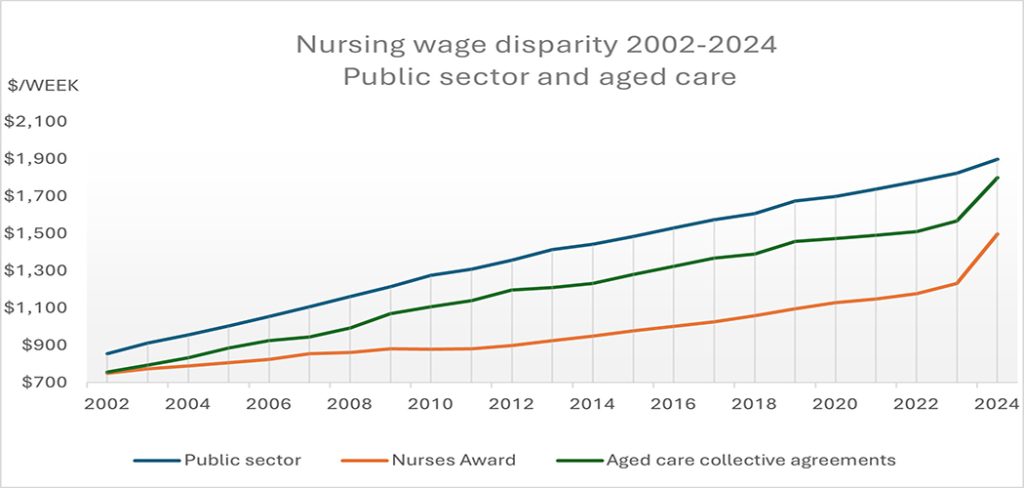The ANMF currently has two Work Value cases before the Fair Work Commission (FWC).
Work Value case – Aged care industry
This case commenced in late 2020 and was progressed due to the efforts by the ANMF and Health Services Union.
The wages gap between nurses and carers working in aged care and those working in the public sector has narrowed because of the Aged Care Work Value Case (ACWVC), with the interim decision of the FWC increasing rates of pay for nurses and carers by 15% effective 30 June 2023.
Due to Commonwealth Government1 guidelines, the full value of this 15% was flowed to nearly all nurses and carers, including those covered by pre-existing enterprise agreements (EAs).
Nationally, 154 EAs have been negotiated in the aged care sector since the ACWVC increases started to flow through to nurses and carers in July 2023. These new agreements have had to factor in the higher rates in the Nurses Award 2020 (Award) and the Aged Care Award 2010.

The graph shows an example of the stark increase in nurses wages in the aged care sector since the ACWVC. The weekly full-time top paypoint of the RN Level 1 classification (or equivalent) is shown with public sector figures being an average of the states and territories.
From August 2022 to August 2024 the rates of pay for nurses and carers working in aged care have increased around 25%, including national safety net adjustments.
Work value case – Nurses and midwives
This case commenced in early 2024. This second ANMF application seeks to increase wages in the Awardfor all nurses, midwives and nursing assistants who do not work in the aged care sector. It also seeks to rename and update the Award to acknowledge its coverage of midwives.
This case now also includes the finalisation of the classification structure and rates of pay for nurses working in aged care.
How these ANMF cases affect you
These cases are most relevant to ANMF members working in Fair Work Act jurisdictions, being private sector members plus the public sector in Victoria, the ACT and Northern Territory. However, public sector employers in all jurisdictions are acutely aware of the case and its potential flow-on effects.
Aged care nurses and carers received an increase in their hourly rate of pay to reflect the 15% interim increase to award wages for aged care workers. This increase may be in your EA or have been passed on in addition to any EA increases. Future increases in this case must also be passed on.
When your current EA is up for negotiation, any new rates must be no less than the Award rate.
When there is an outcome in the Nurses and Midwives Case, the process and effect on your EA will be like the ACWVC. EA rates in the private sector have historically been set at higher rates than Award rates, so the impact of any Award increase on EA rates will vary depending on the employer.
If you are paid above Award rates after any increase, you may still get a pay rise because of enterprise bargaining or requirements to pass on additional Government funding to your sector.
If your current rate of pay is less than the new Work Value Award rate, you must receive a pay increase to ensure you are paid the Award rate as a minimum.
Whatever the FWC Expert Panel decides, it should be noted that the ANMF cannot determine the outcome. For example, the ANMF case has consistently been to maintain the current relativities in the Award. However, as an independent umpire, the FWC Expert Panel may decide to implement something different.
Reference:
1 Aged Care Worker Wages: Guidance for aged care providers on the provision of funding relating to Stage 2 of the Fair Work Commission Aged Care Work Value Case, June 2023








